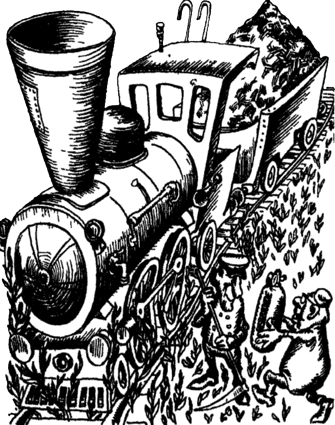107Stories About ChemistryINDEX |
106.
The Farmer�s Helpers
The boy is just over sixteen. And here he is, probably for the first time in his life, in a perfumer�s shop, not out of mere curiosity, but out of necessity. He has a moustache coming and he has come to buy shaving things. It is quite a thrilling operation for beginners, but after about ten or fifteen years of it one sometimes prefers to grow a beard. Grass is intolerable on a railway bed. And so people �shave it� with sickles and scythes from year to year. But take the Moscow-Khabarovsk railway. It is nine thousand kilometres long, and to cut all the grass on it (which has to be done several times each summer) almost a thousand full-time workers would be needed.  Could no chemical method of �shaving" be invented? It appears there could. To cut the grass on one hectare 20 men have to work a whole day. Herbicides complete this operation over the same area in a few hours, wiping out the grass completely. Do you know what defoliants are? �Folium� is the Latin for leaf. A defoliant is a chemical which makes leaves fall. The use of defoliants has made it possible to mechanize cotton harvesting. Year after year, century after century, men used to go out into the fields and pick the cotton bolls by hand. Anybody who has not witnessed manual cotton picking can hardly imagine what hard labour it is, nor is it made any easier by having to be performed in the sun at a temperature of 40 or 50�C. Now everything is much simpler. A few days before the cotton bolls open the cotton plantation is treated with defoliants. The simplest of these is Mg[ClO3]2. The leaves fall off the bushes and then cotton combines come out into the field. Incidentally, another chemical that can be used as a defoliant is CaCN2, and the part of it that falls on the ground when the bushes are treated is a nitrogenous fertilizer to the soil. But chemistry has gone still further in helping agriculture to �rectify� nature. Substances called auxins, which are referred to as plant hormones stimulating plant growth, have been discovered. At first only natural compounds were used for this purpose, but now chemists have learnt to synthesize the simplest of them, heteroauxin, for example, in the laboratory. These substances not only accelerate growth, blossoming and fruiting of plants, but also improve their resistance and vitality. Besides, it was found that the use of auxins in elevated concentrations has the directly opposite effect, retarding the growth and development of plants. Here we have an almost full analogy with medicinals. There are medicines which contain arsenic, bismuth, and mercury, but in large (rather, elevated) concentrations all these substances are poisonous. For instance, auxins can greatly lengthen the blossoming period of decorative plants, primarily, flowers. In case of sudden spring frosts they can retard the budding and blossoming of trees, and so on and so forth. On the other hand, in the cold regions where the summer is short they make it possible to grow many fruits and vegetables at accelerated rates. And though these properties of auxins have not been realized on a mass scale as yet, there is no doubt that in the near future these farmers� helpers will find extensive usage. |





